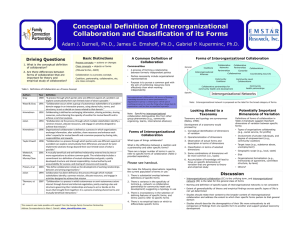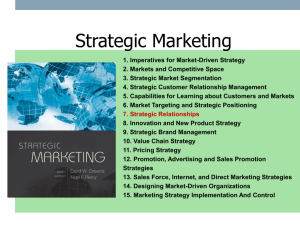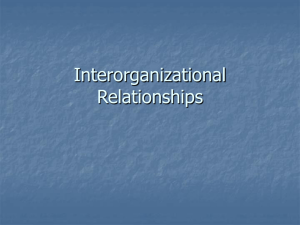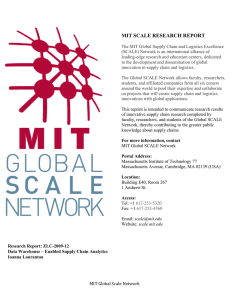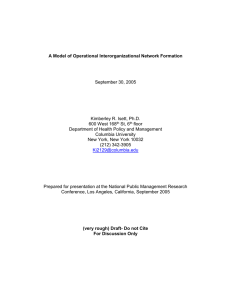MIT SCALE RESEARCH REPORT
advertisement
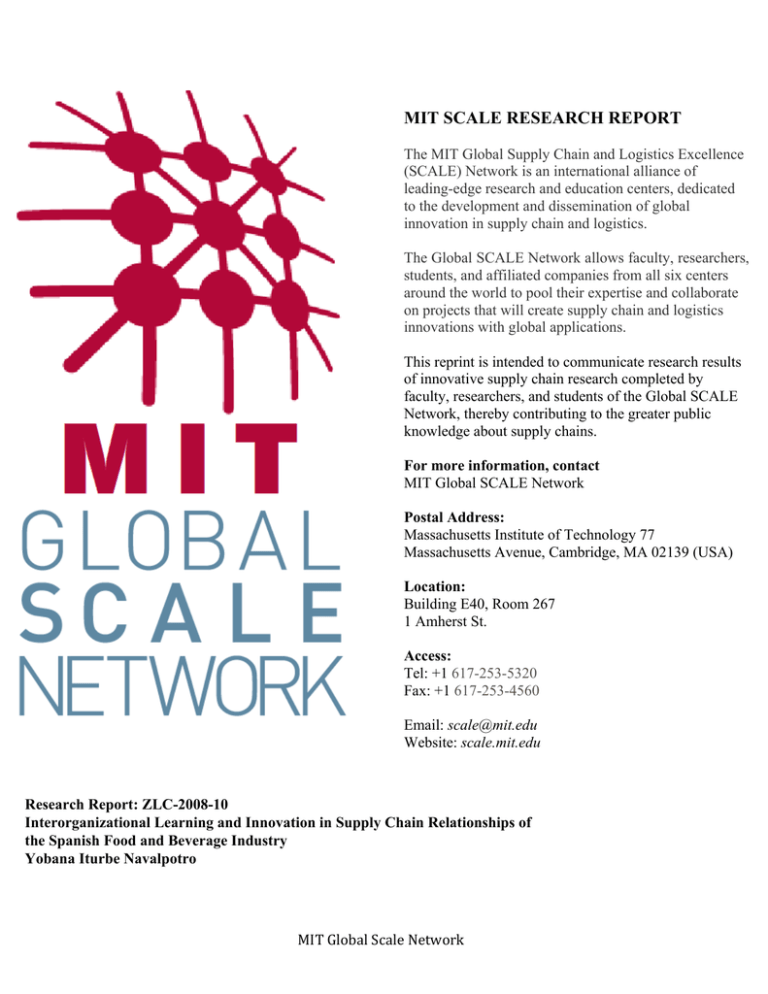
MIT SCALE RESEARCH REPORT The MIT Global Supply Chain and Logistics Excellence (SCALE) Network is an international alliance of leading-edge research and education centers, dedicated to the development and dissemination of global innovation in supply chain and logistics. The Global SCALE Network allows faculty, researchers, students, and affiliated companies from all six centers around the world to pool their expertise and collaborate on projects that will create supply chain and logistics innovations with global applications. This reprint is intended to communicate research results of innovative supply chain research completed by faculty, researchers, and students of the Global SCALE Network, thereby contributing to the greater public knowledge about supply chains. For more information, contact MIT Global SCALE Network Postal Address: Massachusetts Institute of Technology 77 Massachusetts Avenue, Cambridge, MA 02139 (USA) Location: Building E40, Room 267 1 Amherst St. Access: Tel: +1 617-253-5320 Fax: +1 617-253-4560 Email: scale@mit.edu Website: scale.mit.edu Research Report: ZLC-2008-10 Interorganizational Learning and Innovation in Supply Chain Relationships of the Spanish Food and Beverage Industry Yobana Iturbe Navalpotro MITGlobalScaleNetwork For Full Thesis Version Please Contact: Marta Romero ZLOG Director Zaragoza Logistics Center (ZLC) Edificio Náyade 5, C/Bari 55 – PLAZA 50197 Zaragoza, SPAIN Email: mromero@zlc.edu.es Telephone: +34 976 077 605 MITGlobalScaleNetwork ________________________________________________________ Interorganizational Learning and Innovation in Supply Chain Relationships of the Spanish Food and Beverage Industry Yobana Iturbe Navalpotro EXECUTIVE SUMMARY ________________________________________________________ This thesis, which has primarily a practical and instructive focus, is aimed at deepening the development of learning and of innovation among companies of the Spanish food and beverage sector, and more concretely, of the relationship of the producer with its strategic supplier. The present study is framed within a larger research project on innovation in supply chain relationships carried out by the Supply Chain Management Laboratory (scmLAB). After a serious and rigorous analysis of the current situation of the industry, as well as a study of Supply Chain Collaboration, Interorganizational Learning, and Interorganizational Innovation, we proposed a theoretical model and related hypotheses, ending with an exploratory study of focus group data obtained from the questionnaire we designed and sent to the companies. Finally, we proposed the methodology and a population sample to build a statistical analysis of the future data gathered. These above sections are; • Spanish food and beverage industry. The current situation aligned with new challenges concerning the economic and social transformation of the sector is outlined. • We drew on a two-step relational model in the research. The first stage investigates of the main antecedents that are decisive for the appropriate development of interorganizational learning and interorganizational innovation, which are; - Market Context, including features such as type of market, competency, product characteristics, suppliers, and customers. - Structural Aspects of the cooperation with its strategic supplier, like durability, power balance, communication settings and contracts. - Behavioural Aspects, analyzing the companies’ attitudes towards collaboration, such as personnel's motivation, mangers implications, information flows, previous knowledge, climate and culture. The second stage measured the success of the relationship and the general performance of the company to see if any kind of positive relation exists between interorganizational learning and interorganizational innovation performances and the company’s overall performance and what the manufacturer’s perceptions of the relationship’s success are. • We proposed 26 hypotheses. Executive Summary, MIT-Zaragoza Master’s Thesis, 2008 1 Interorganizational Learning and Innovation in Supply Chain Relationships of the Spanish Food and Beverage Industry • A questionnaire to operationalize the theoretical model and hypothesis proposed, was designed, validated with the SQP software and sent to the companies to collect data. • We made a focus group test with people from purchasing procurement or similar positions to check it and obtain some preliminary observations. • We also propose the data analysis methodology, population and sample to be used for future research. • A conclusion is finally included to present which the most outstanding tendencies and observations obtained from the focus group test we made were, as well as the relevance that the companies confer to certain aspects argued in this thesis. Theoretical Model and Hypothesis Market Context - Market - Product - Client - Suplier - Competency H1a H2a H1b H3a H2b Success Relationship H3b H4a Structural Aspects of Alliances - Contracts or agreements (formal, upgrades) - Communication settings - Durability - Power H14 H5a H6a Interorganizational Innovation Performance H5b H6b Interorganizational Learning H11a H9a H10a H7a H13 Company’s overall results H8a H12 H11b H10b Cooperative Behavior - Communication to employees - Personal (closer relationship, teams, managers) - Climate & Culture of Quality - Previous knowledge & results - Information flow (feed-back) - New technologies H15 H4b H9b H8b H7b We chose the supply chain relationships in the Spanish food and beverage industry framework because preceding studies in the field generally refer to individual companies´ actions that bring about learning or innovation. We did not seek to measure the individual firm’s level of innovation and learning, but the performance of innovation and learning through companies working together in a partnership. Boddy (2004) pointed out that supply chain partnering “occurs when organizations at related points in a supply chain agree to work in a co-operative rather than an adversarial manner,” and is defined as “a situation in which there is an attempt to build close long-term links between organizations in a supply chain that remain distinct, but which choose to work closely together.” Previous studies of the food industry estimated that poor co-ordination among supply chain partners is wasting million annually. Therefore, Small and Medium Enterprises in the food and beverage industry need to increase innovation in order to improve and survive, as pressure from larger more agile companies encroaching on their markets and increasing integration in the supply chain threaten them. Moreover, in recent years, innovation has been seen as consisting of a learning process that can feed off diverse sources and present a dynamic character in which experience accumulated in innovative matters are indicative of the capacity of current innovation. Executive Summary, MIT-Zaragoza Master’s Thesis, 2006 2
